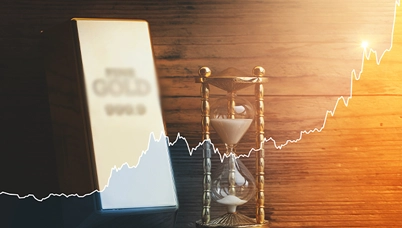Has Gold De-coupled?
Posted On Thursday, May 13, 2010
"Gold is behaving strange!" - So say many confused investors after observing this commodity’s recent behavior – Gold moving in tandem with the dollar.
Traditionally, gold and dollar have always moved in opposite directions. Therefore, given the recent corollary, investors are a bit puzzled about gold’s recent price pattern.
Let’s take a look at this scenario in detail, but just a clarification: Don’t think of Gold as an "anti-dollar" story but rather look at it as an "anti-fiat (paper) currency". If you have understood this important trait, you would have no doubts about gold’s recent rise.
Chart: Gold in SDRs

Source: Bloomberg
Now getting back to our main topic of discussion; the Euro was increasingly under pressure as the Greek debt saga continued. And before the manifestation of the "rescue package", there was a looming fear of a contagion risk as rising deficits and unsustainable debts threatened to cripple many other nations. Hence, as the Euro, which was seen as an alternative to the dollar, struggled for its survival, which lifted the dollar in return.
All said and done, the underlying theme is that gold prices will continue to rise in real terms as the general level of confidence in fiat (paper) currencies declines. The dollar was rising vis-à-vis the Euro as problems in the Euro got highlighted. In real terms however, (measured in gold), the dollar is trading at record lows, signifying that it’s not the dollars own merit, but rather weakness in its counterparts that is lifting the buck.
What to expect?
To salvage a sovereign-debt crisis, European policy makers have unveiled a loan package worth nearly $1 trillion and a program of securities purchases. And markets rallied around the world in response to the concerted defense of the Euro. The knee-jerk reaction in the financial markets following the announcement now clearly seems that of short covering. In fact as I write this article, most of them are headed back lower.
The European leadership stung by criticism, alleging lack of aggression in managing the deepening crisis, and now finally realizing the urgency of the situation, has brought out what is popularly known as the "nuclear option" in order to stave off the crisis. Unfortunately, this only manages to buy time, and does not offer a real solution to the problem.
The rational question to ask here is - The solution to a debt crisis is... more debt?
A loan is a debt, you know. So we`re going to solve a sovereign debt crisis by issuing more debt. The Euro-zone leaders assume that this is a liquidity problem. In fact, it is not. It is a problem of debt laden balance sheets blowing out of proportions. You do not solve a debt problem with more debt.
It`s quite stunning to even think that a nation or group of nations with too-much-debt problems could reach a solution by taking on some more debt. Honestly, this exercise is not about bailing out Greece, it is actually deliverance for private lenders i.e. banks and financial institutions who have lent to these troubled governments. Why should these private guys be bailed out by taking over debt in public hands?
How would it be funded?
The Euro-zone on a combined basis is already running a deficit of €800 billion. Now, with a trillion dollars more to dole out, it would nearly lead to doubling of the deficit. The European central government must invent new structures to administer the promised aid.
For all the excitement about the scale of the effort, it is important to remember that the core fund does not currently exist. The fund, known as a "special purpose vehicle", would raise money by issuing debt and making loans to support ailing economies. The European countries would guarantee that fund, but, with more European economies coping with rising deficits, raising, guaranteeing or backing such a large sum is not going to be an easy task.
There’s still a question mark on the so called trillion-dollar-rescue-package: whether it will see the light of the day. It might yet fail to pass the muster with national governments, since this deal has to be ratified by legislations of different countries. It is a known fact that Europe’s fund will require the sustained support of the 27 nations that form the European Union - not to mention its richest member, Germany, which has until now deeply opposed a bailout.
In the ensuing days, it looks increasingly likely that the markets will discern the truth of the source of the funding, and the tragic irony that the very nations that are in trouble have to - somehow - manage to cut their fiscal deficits and at the same time sell more debt to fund their package.
So in case the EU manages to turn around trillion dollars to support economy, it would be sufficient enough to prevent any country from having to default in the near term. Also, the enormity and sensitivity of the issue has the potential to intensify tensions between countries of the Euro-zone. The confederacy is under conflict as it now gets bifurcated in two parts; one involving the rich nations who would lend and on the other hand we have borrowers who have been involved in extravagant spending. The astonishing amount of money involved is only going to increase resentments.
In effect, though Germany and other wealthier European countries are assuming responsibility for the creditworthiness of Greece, Portugal and the other debt delinquents, it is an evident fact that these nations missed fiscal prudence when we had economic boom on hand. And hence, it remains uncertain if more talks of regulation and oversight from EU and IMF involvement will be enough to return European nations to fiscal health, more so, as revenues shown no signs of increasing, and as their economies continue stagnating and social pressures keep building.
Also, it is unlikely that the countries receiving support will let others permanently dictate their economic policies, and voters in the supporting countries will not be too willing to permanently support these countries financially.
Therefore, even though near term pressure may be looking less explosive, structural pressure in Europe continues to remain unaddressed.
Yes, Greece is facing dire consequences of its own economic failings, but broadly speaking, the major factors that contributed to this financial position - for e.g unsustainable long term economic policies, lack of public credibility, and dependence on foreign investors, - do mirror in many ways the trajectory of the United States. The two countries differ in many important ways, but Greece`s situation is a reminder of what can happen when fiscal policy gets out of control.
Credit conditions are tightening and should continue to tighten. It won’t be late before investors question the ability of governments to repay. Eventually, the authorities, most likely, will try to inflate their way out of the tightness.
In such turbulent times, there is a need for a safe haven investment, and historically, gold has been the ultimate store of value in times of financial confusion. Gold should live up to this expectation going forward as uncertainty looms large, and increasing sovereign risk is only further fueling the appetite for gold.
Sovereign default risks question the promise built into every currency note and tend to dismantle the confidence and faith in the currency, and more importantly in the government who issues it. At such instances, citizens begin doubting the safety of the currency, like in Greece where people have started to move their money to other safer countries.
In such a scenario of uncertainty, gold seems to be the only safest bet.
Click here to invest in the Quantum Gold Fund ETF
Disclaimer:
The views expressed in this article are the personal views of the Fund Manager of Quantum Gold Fund. The views constitute only the opinions and do not constitute any guidelines or recommendation on any course of action to be followed by the reader. This information is meant for general reading purpose only and is not meant to serve as a professional guide/investment advice for the readers. This article has been prepared on the basis of publicly available information, internally developed data and other sources believed to be reliable. Readers are advised to seek independent professional advice and arrive at an informed investment decision before making any investments. Please visit – www.quantumamc.com/disclaimer to read scheme specific risk factors.
Related Posts
-

Equity Monthly for January 2026
Posted On Friday, Jan 02, 2026
Indian markets remained range-bound in 2025
Read More -

Gold Monthly for January 2026
Posted On Thursday, Jan 01, 2026
Gold Market Review and Outlook: 2025–2026
Read More -

Debt Monthly for January 2026
Posted On Thursday, Jan 01, 2026
Navigating 2026: India’s Bond Market in a Changing Global Landscape
Read More



